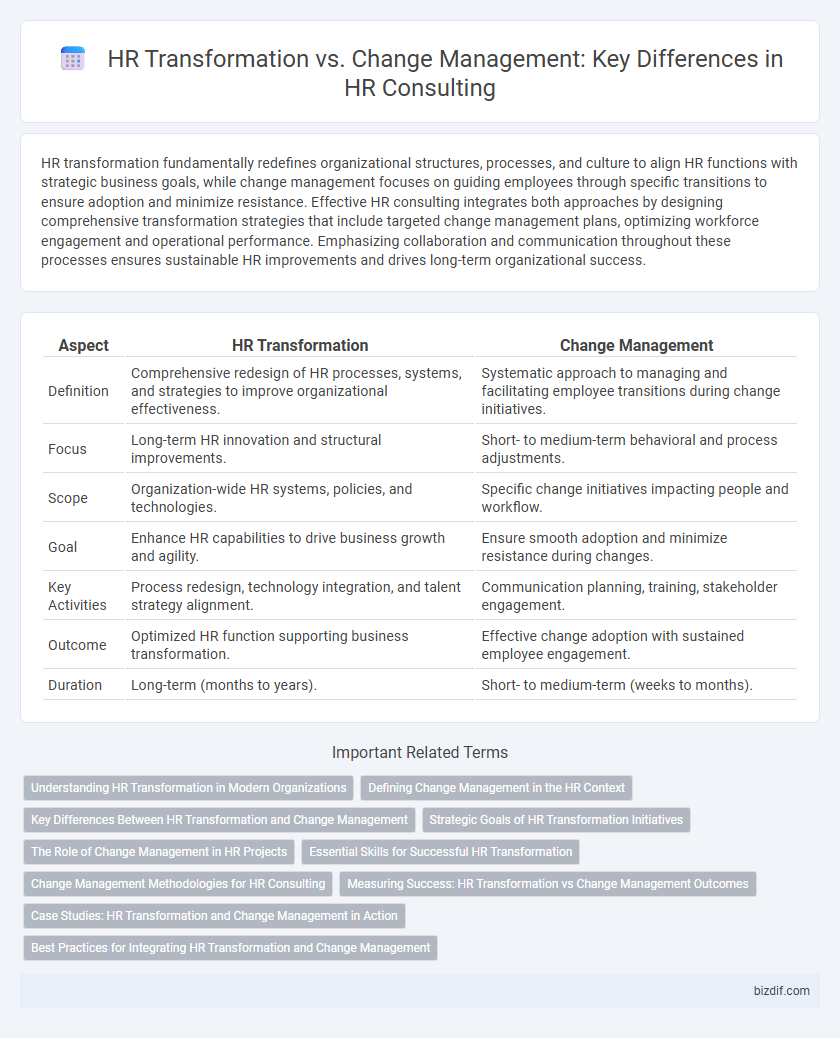HR transformation fundamentally redefines organizational structures, processes, and culture to align HR functions with strategic business goals, while change management focuses on guiding employees through specific transitions to ensure adoption and minimize resistance. Effective HR consulting integrates both approaches by designing comprehensive transformation strategies that include targeted change management plans, optimizing workforce engagement and operational performance. Emphasizing collaboration and communication throughout these processes ensures sustainable HR improvements and drives long-term organizational success.
Table of Comparison
| Aspect | HR Transformation | Change Management |
|---|---|---|
| Definition | Comprehensive redesign of HR processes, systems, and strategies to improve organizational effectiveness. | Systematic approach to managing and facilitating employee transitions during change initiatives. |
| Focus | Long-term HR innovation and structural improvements. | Short- to medium-term behavioral and process adjustments. |
| Scope | Organization-wide HR systems, policies, and technologies. | Specific change initiatives impacting people and workflow. |
| Goal | Enhance HR capabilities to drive business growth and agility. | Ensure smooth adoption and minimize resistance during changes. |
| Key Activities | Process redesign, technology integration, and talent strategy alignment. | Communication planning, training, stakeholder engagement. |
| Outcome | Optimized HR function supporting business transformation. | Effective change adoption with sustained employee engagement. |
| Duration | Long-term (months to years). | Short- to medium-term (weeks to months). |
Understanding HR Transformation in Modern Organizations
HR Transformation in modern organizations involves the comprehensive redesign of HR functions to align with evolving business strategies, leveraging digital technologies and data analytics to improve workforce productivity and employee experience. Unlike Change Management, which addresses the human side of transitions, HR Transformation focuses on optimizing processes, systems, and organizational structures to drive strategic value. Key components include adopting cloud-based HR platforms, automating routine tasks, and fostering a culture of continuous improvement to support agile and scalable HR operations.
Defining Change Management in the HR Context
Change management in the HR context involves systematically guiding employees through transitions related to organizational restructuring, new technology adoption, or shifts in corporate culture to ensure smooth adaptation and sustained performance. It emphasizes communication, training, and support mechanisms tailored to individual and team needs, minimizing resistance and maximizing engagement. Effective HR change management aligns workforce strategies with business objectives, fostering a resilient and agile organizational environment.
Key Differences Between HR Transformation and Change Management
HR Transformation involves a comprehensive redesign of HR processes, technology, and organizational culture to align with business strategy, whereas Change Management focuses on guiding employees through specific changes to minimize resistance and maximize adoption. HR Transformation is a broad, strategic initiative impacting long-term HR capabilities, while Change Management is tactical, managing the human side of change during projects or transitions. The key difference lies in scope: HR Transformation redesigns the HR function at a systemic level, whereas Change Management ensures effective implementation of targeted changes within that framework.
Strategic Goals of HR Transformation Initiatives
HR Transformation initiatives prioritize aligning human capital strategies with overarching business objectives to drive sustainable growth and competitive advantage. These efforts emphasize redesigning organizational structures, enhancing workforce capabilities, and integrating advanced technologies to optimize HR processes. Strategic goals include improving employee engagement, fostering innovation, and enabling agile talent management to support long-term organizational success.
The Role of Change Management in HR Projects
Change management plays a crucial role in HR transformation projects by ensuring smooth adoption of new processes and technologies across the organization. It involves structured communication, training, and stakeholder engagement strategies to minimize resistance and drive sustainable behavioral change. Effective change management increases the success rate of HR initiatives by aligning employees with the transformation goals and embedding new practices into the corporate culture.
Essential Skills for Successful HR Transformation
Successful HR transformation requires mastery of strategic workforce planning, digital HR technologies, and data-driven decision-making to align HR functions with evolving business goals. Expertise in stakeholder engagement, agile project management, and continuous learning fosters adaptability and resilience during complex organizational changes. Developing robust communication skills and change advocacy ensures seamless integration of new processes while minimizing disruption and maximizing employee buy-in.
Change Management Methodologies for HR Consulting
Change management methodologies in HR consulting prioritize structured approaches like ADKAR, Kotter's 8-Step Model, and Lewin's Change Management Model to facilitate effective organizational transition. These frameworks enable HR professionals to address resistance, communicate effectively, and sustain behavioral change during HR transformation initiatives. Implementing proven methodologies ensures alignment of HR strategies with business goals, enhancing employee adoption and optimizing transformation outcomes.
Measuring Success: HR Transformation vs Change Management Outcomes
Measuring success in HR Transformation involves assessing long-term strategic alignment, operational efficiency improvements, and cultural integration within the organization. Change Management outcomes focus on employee adoption rates, reduction in resistance, and the achievement of specific project milestones. Key performance indicators (KPIs) such as productivity metrics, employee engagement scores, and turnover rates provide quantifiable data to evaluate both HR Transformation and Change Management effectiveness.
Case Studies: HR Transformation and Change Management in Action
Case studies reveal HR transformation integrates advanced technologies and data analytics to streamline talent management, while change management emphasizes employee engagement and communication strategies during the transition. Organizations implementing HR transformation see increased operational efficiency and improved decision-making through digital tools. Effective change management ensures smooth adoption by addressing resistance and fostering a culture aligned with new HR processes.
Best Practices for Integrating HR Transformation and Change Management
Effective HR transformation integrates change management by aligning strategic goals with employee engagement and communication plans to ensure smooth transitions. Best practices include leveraging data-driven insights to tailor change initiatives, involving leadership at all levels to champion transformation, and continuously monitoring progress through key performance indicators (KPIs). Embedding agile methodologies and fostering a culture of adaptability enhances the sustainability of HR transformation outcomes within organizations.
HR Transformation vs Change Management Infographic

 bizdif.com
bizdif.com